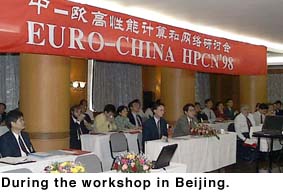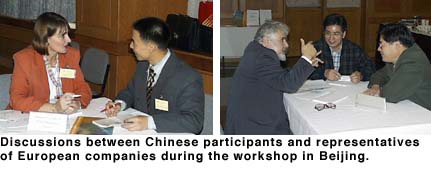ERCIM News No.37 - April 1999
![]()
ERCIM News No.37 - April 1999
EU-China High Performance Computing and Networking Initiative
by Eckart Bierdümpel and Thierry Priol
Papers and slides
presented at the European Workshops on HPCN in:
Pisa, 16 June 1997 and Abingdon 18 June 1997
- Short Overview of the Initiative and the Day [MSPowerPoint4.0] [pdf]
- HPCN - A Tool for European and Chinese Users [rtf] [pdf]
- High Performance Computing in China [rtf] [pdf]
- Information Technology - The Great Potential in China [MSPowerPoint4.0] [pdf]
- Case Study: Establishment of a High Tech Joint Venture [rtf] [pdf]
- Actions and Next Steps [MSPowerPoint4.0] [pdf]
Further information (hand-outs only):
- China: Main Figures [MSPowerPoint 4.0] [pdf]
- 1000 MPP - an Introduction to the Dawning 1000 Massively Parallel Processing Computer System
- Risks and Failures of a Joint Venture in China [MSPowerPoint4.0] [pdf]
- List of Further Information Material [rtf] [pdf]
All presentations slides in a .zip archive [MS-files.zip] [pdf-files.zip]
If you are interested to obtain a copy of the slides presented during the meeting and/or the further information material, please contact eckart.bierduempel@gmd.de
Related sites
Esprit, the EU information technologies programme
- homepage
- notebook entry on this initiative: EU-China industrial initiative in HPCN launched
- HPCN homepage
CHINESI: CHINa-Europe Software Initiative, coordinated by the European Software Institute (ESI)
Following a request by the European Commission, ERCIM has set up an ‘EU-China High Performance Computing and Networking (HPCN) Initiative’ to foster business, industrial and technological co-operation between European and Chinese operators in this high-ech sector. HPCN is a crucial technology of strategic importance for European industrial and scientific competitiveness. It has the potential for great and far-reaching impact on productivity, industrial competitiveness, environmental management and many other aspects of economy and society. The use of HPCN systems for commercial applications is expected to be taken up vigorously in the second half of the decade, both in Europe and in emerging economies, such as China.
The first meeting of a Chinese Delegation with European experts and officials from the European Commission was held in Brussels. The meeting was followed by a familiarisation tour for the Chinese in Europe, organised by ERCIM and included visits at companies in Belgium, France, Germany, England and Italy. Two European workshops were organised by ERCIM in Pisa and Abingdon. There the organisers presented the initiative, while the Chinese partners gave an overview on HPCN activities and the potential of IT in general in China. As an example, the experience of setting up a high-ech joint venture between a European and a Chinese partner was presented, followed by a lively discussion on the obstacles and problems. Also the chances of setting up such a joint venture and the initiative in general was discussed.

It was concluded that considerable interest was shown by the participating organisations in a co-operation with Chinese companies and institutions. Furthermore there was a noticeable interest by other companies who couldn’t make it to the meetings. As a result of the European workshops, 75 companies registered as potentially interested in the initiative.
While ERCIM was waiting for the Chinese to organise a similar workshop in China, a preliminary report was released on the situation of HPCN in China. The report was based on the information gathered from Chinese web sites and newsletters; from people who visited China or already had experience in co-operations with Chinese institutions and also with some input from China itself.
The Chinese workshop was held in Beijing in October 1998. It started with presentations of the participating European companies, the Technology Transfer Network (TTN), a European initiative for technology transfer in the HPCN sector funded by the Esprit Programme of the European Union, and the ten selected Chinese institutions. After the presentations, the Chinese participants could discuss issues directly with the European representatives. An immediate positive result from this initiative was the contact established between different companies and institutions from Europe and China.

The Chinese side stated that the workshop was a useful experience and that they found the TTN scheme very interesting. They were missing this kind of action in the part they learned from American and Japanese counterparts. At that time, China had established several HPC centres which mainly host HPCN systems neglecting information dissemination and technology transfer. Therefore they were interested in setting up a remote node of the European TTN in China. In addition to the European TTN nodes, they would like to offer access to HPCN platforms to Chinese end-users. Such platforms should be created from Chinese hardware with demonstration versions of European software including documentation and training. Such a node could serve as a European window in China to promote European technology and know-how plus enhanced co-operation between China and Europe. Another goal of this Chinese TTN node could be the summarised translation of documents from the European TTN in Chinese for dissemination in China. So the Chinese participants said that they would recommend to the government to set up a similar scheme in China. The Chinese participants also showed interest in business contacts with the European companies represented at the meeting. These companies were also quite satisfied with the feedback they got from the Chinese hosts.
In conclusion, the 4 goals of this initiative were mostly fulfilled:
- raising the awareness of the available technology and expertise for companies with potential interest in HPCN in China and in Europe
- informing the business community in this field about the market opportunities in China and Europe
- offering a business forum, where direct contacts between potential partners from Europe and China can be made
- trying to establish more co-operation between European and Chinese companies.
Please contact:
Eckart Bierdümpel - GMD
Tel: +49 2241 14 2256
E-mail: eckart.bierduempel@gmd.de
Thierry Priol - INRIA
Tel: :+33 2 99 84 72 10
E-mail: Thierry.Priol@irisa.fr